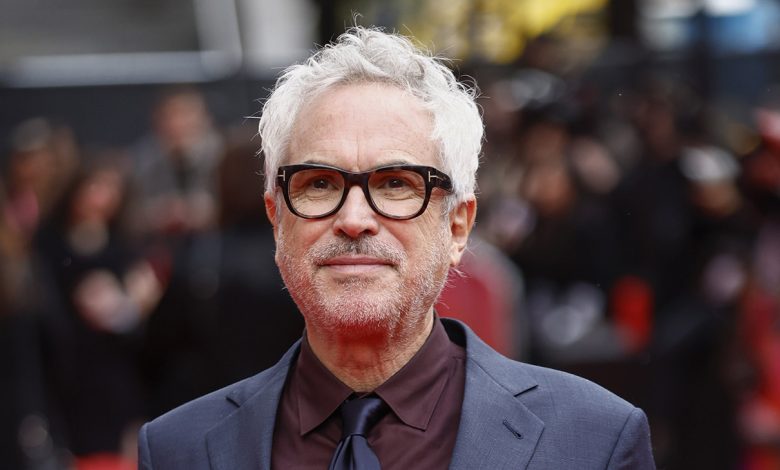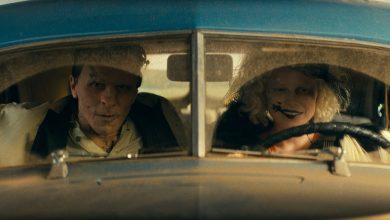Alfonso Cuarón on An Almost Christmas Story, the Die Hard Debate

“Have you ever wondered what makes a Christmas story a Christmas story?”
This is the underlying question to the Disney+ short film An Almost Christmas Story, and producer Alfonso Cuarón heartily laughs at the notion that he and director David Lowery were trying to settle the age-old debate about whether Die Hard is a Christmas movie or not. The 24-minute animated short — Cuarón’s third-and-final installment in his holiday collection that dates back to 2022 — is based on the true story of an owl that was rescued from the Rockefeller Plaza Christmas tree in 2020. Cuarón’s story, in tandem with Lowery and Jack Thorne’s script, teaches their young owl named Moon (Cary Christopher) what Christmas is as he seeks to reunite with his family.
Ultimately, the Oscar-winning Cuarón believes that the definition of a Christmas story doesn’t have to be broken down into an exact science. Die Hard may have all the trappings and thematics of a Christmas story, but its indescribable feeling of Christmas doesn’t need to be qualified through its use of paper snowfall and themes of reconciliation.
“Ultimately, Christmas is the end of darkness and the beginning of light. It’s a celebration of hope and possibilities, and it’s a time of introspection before we start anew,” Cuarón tells The Hollywood Reporter. “In the case of Die Hard, Bruce Willis is trying to do right, and I am all for Die Hard as a Christmas story. I cannot define why and I don’t need to define why.”
In 2018, Cuarón released his semi-autobiographical tale known as Roma, winning three Oscars in the process, including best director. Since then, several other filmmakers have explored their childhoods on screen, such as Steven Spielberg (The Fabelmans), Kenneth Branagh (Belfast) and James Gray (Armageddon Time). But Cuarón refuses to call himself a trendsetter, instead chalking the wave up to the pandemic, age and a need for introspection during the technological age of disconnection.
“It would be presumptuous or naive of me to think, ‘Okay, they saw Roma, and then they immediately wrote something and shot it very quickly,’” Cuarón says. “We’re bombarded with so much information, and it’s done so at a rate that we have never experienced before. So it’s an instinctive thing to seek refuge in trying to understand who you are or where you came from, and it’s not a coincidence that all of these films happened more or less at the same time.”
Below, during a recent conversation with THR for An Almost Christmas Story, Cuarón also discusses his collaboration with Lowery and the latter’s inspired choice to use corrugated cardboard as a visual building block. He then expresses his concerns about AI’s impact on filmmaking going forward.
***
So the original plan was three Christmas-themed shorts for Disney+ over three consecutive years?
The original plan was not even specifically Christmas. It was originally supposed to be more about different cultures’ celebrations at the end of the year. And just because of the directors that got involved, their scope has been Christmas.
Were all three ideas selected at the same time?
No, when I called Alice Rohrwacher and invited her to do [2022’s] short film about Christmas, she said, “Well, yeah, but I don’t have a story. If I think of anything, I’ll let you know.” And then she called me the next morning and said, “I have this story [Le Pupille].” But she didn’t even have to tell me the story, because, whatever Alice wants to do, I want to see. The second short, The Shepherd, is based on [Frederick Forsyth’s] book that I’d always wanted to adapt, and when I learned that Iain Softley was already working on it, we joined forces. And for An Almost Christmas Story, I heard the real story of this little owl that got trapped in the tree that ended up being cut down and placed at Rockefeller Center. So I wrote the story in the frame of Christmas, and Jack Thorne wrote the screenplay. We then approached David Lowery, who rewrote the screenplay and created his own beautiful vision.
An Almost Christmas Story Disney+
You and David Lowery hadn’t worked with traditional animation all that much. Was that relative unfamiliarity part of the overall appeal?
Well, in many ways, it wasn’t unfamiliar because David and I have both employed animation. I mean, I have done an animated film already. People are not very aware that Gravity is maybe 80-percent animation. David has also employed animation through the effects that he’s done in his different films, but we’ve never fully honored the form of animation, per se. So it’s something that David wanted to try, and I still want to try it as a director at some point.
You and David are both friends with Guillermo Del Toro, so I initially assumed that you were both inspired to use stop-motion based on his recent use of the technique in his Pinocchio movie. But I was surprised to learn that An Almost Christmas Story is not actually stop-motion. It’s CG animation that’s partially meant to appear that way?
Well, yes, but David wanted to do this very interesting thing that was not quite stop-motion. He didn’t want to cheat stop-motion. He wanted to emulate the animation that he used to do as a child; he used to do animation with corrugated cardboard boxes. So he wanted to bring that aesthetic and spirit into this animated film, and that’s why he purposely made it look incomplete. When you’re a child and you attempt to animate, you might take more care of your character and the foreground, but then the background is less polished and less finished. So that’s what he was doing. If you watch the short again, you’ll realize that the extras in the city are mostly cardboard cutouts, and the cars are also crudely made with cardboard. So David’s choice really grounded his film in a very accessible and innocent place.
An Almost Christmas Story Disney+
You and David are both able to jump back and forth between family entertainment and more mature, idiosyncratic material. Did that commonality come up at all in your talks?
We were never explicit about it, but I think that’s why I’ve always been attracted to him as a filmmaker. When he does films that are more family-oriented, he’s not patronizing the children in the audience. He’s trying to convey important thematics, but through the prism of innocence.
This short is the byproduct of hundreds of people’s craftwork, and right now, billions of dollars are being invested in AI technology that reduces the number of people needed to make something like this. How worried are you about the future of animated works like this one?
Yeah, that is really concerning. It’s almost as if this technology has been developed to get rid of people and the workforce, so I find it very depressing and very concerning. There’s something that is incredible about human craft. It is the beauty of imperfection and the beauty of last-minute decisions that are completely random. They don’t come from a precise algorithm; they convey part of our own state of mind. I’m not only talking about above-the-line talent, but also every single craftsman that is involved in a project. Their energy and their emotions are conveyed through their tools. So, yes, I find it disheartening. I am not questioning that technologies [like AI] can sometimes help you with shortcuts, but not when those shortcuts are at the expense of people.
An Almost Christmas Story Disney+
An Almost Christmas Story asks the question, “What makes a Christmas story a Christmas story?” and it almost feels like a response to the annual argument about whether Die Hard is a Christmas movie.
(Laughs)
How do you define a Christmas story?
It’s when Bruce Willis tries to save his wife.
(Laughs) Perfect answer.
Ultimately, Christmas is a very specific celebration at the end of the year. It’s the end of darkness and the beginning of light. It’s a celebration of hope and possibilities, and it’s a time of introspection before we start anew. In the case of Die Hard, Bruce Willis is trying to do right, and I am all for Die Hard as a Christmas story. I cannot define why and I don’t need to define why.
It’s not an accident that Die Hard ends with paper snowfall.
There you go!
A lot of filmmakers have made semi-autobiographical works since you did so with Roma in 2018. Steven Spielberg made The Fabelmans; James Gray made Armageddon Time; Kenneth Branagh made Belfast, to name a few. Have you also noticed the wave you’ve seemingly created?
I think it would be presumptuous or naive of me to think, “Okay, they saw Roma, and then they immediately wrote something and shot it very quickly.” This often happens, and I guess that it has to do with the times in which we’re living. You can also make the case with Paul Thomas Anderson’s latest film, Licorice Pizza.
Yeah, that main character was based more on producer Gary Goetzman, but it’s certainly a recollection of PTA’s childhood memories in the Valley.
Yeah, I would also add Once Upon a Time in Hollywood to that bunch even if it’s not about a young Quentin Tarantino. You can clearly see that Quentin is trying to emulate his feelings and emotions from when he was growing up in that period. So you see this all the time: they release a new Beauty and the Beast film and then five more films are made about Beauty and the Beast or Pinocchio or whatever. It just happens. And many filmmakers have a film that is about their childhood because it’s our formative time. As a filmmaker, when you look back on your life, you very often see it in the narrative form.
Some of these projects were born during the pandemic, so Covid likely prompted self-reflection and put everything into perspective for them.
You’re absolutely right. Another part of it is age, and with age comes an introspection about our past. Also, in the times in which we’re living, we’re bombarded with so much information and so much external input, and it’s done so at a rate that we have never experienced before. So it’s an instinctive thing to seek refuge in trying to understand who you are or where you came from, and it’s not a coincidence that all of these films happened more or less at the same time.
Lastly, directing is probably the most satisfying job to you still, but have you found producing to be rewarding in its own right?
Oh, it’s fantastic. The only reason I want to produce is because I’m selfish. I want to see the films of these filmmakers, and I want to collaborate with filmmakers I admire. I’m very lucky to have been involved in the projects of filmmakers that I love as artists and as people. So producing is just an opportunity to hang out with them.
***
An Almost Christmas Story is now streaming on Disney+.
Source: Hollywoodreporter
Related Posts
- Roundball Rocked: With NBA Return Looming, NBC Purges Scripted Roster
- SoundCloud Says It “Has Never Used Artist Content to Train AI Models” After Backlash on Terms of Service Change
- Fox News’ Camryn Kinsey Is “Doing Well” After Fainting on Live TV
- Kerry Washington and Jahleel Kamera in 'Shadow Force.'
Courtesy of Lionsgate
…
- This Alternative Artist Landed a Top-20 Chart Debut With an Album Made Almost Entirely on His Phone





